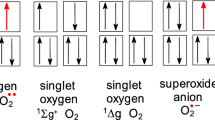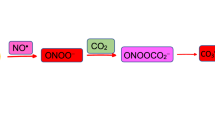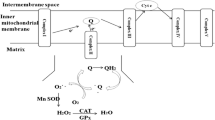Summary.
Non-enzymatic glycation of proteins with reducing sugars and subsequent transition metal catalysed oxidations leads to the formation of protein bound "advanced glycation endproducts" (AGEs). They accumulate on long-lived proteins and are for example structural components of the β-amyloid plaques in Alzheimer's disease. Since the oxidation of glycated proteins as well as the interaction of AGEs with cell surface receptors produces superoxide radicals, it was tested in BHK 21 hamster fibroblast cells and SH-SY5Y human neuroblastoma cells if AGEs can exert cytotoxic effects on cells. Cell viability was assessed with three independent tests: MTT – assay (activity of the mitochondrial respiratory chain), lactate dehydrogenase assay (release of cytoplasmatic enzymes, membrane integrity) and Neutral Red assay (active uptake of a hydrophilic dye). Two model AGEs, chicken egg albumin-AGE and BSA-AGE, both caused significant cell death in a dose-dependent manner. The cytotoxic effects of AGEs could be attenuated by α-ketoglutarate and pyruvate, by antioxidants such as thioctic acid and N-acetylcysteine, and by aminoguanidine, an inhibitor of nitric oxide synthase. This suggests that reactive oxygen species as well as reactive nitrogen species contribute to AGE mediated cytotoxicity. Since AGEs accumulate on β-amyloid plaques in AD over time, they may additionally contribute to oxidative stress, cell damage, functional loss and even neuronal cell death in the Alzheimer's disease brain.
Similar content being viewed by others
Author information
Authors and Affiliations
Additional information
Received April 3, 1998; accepted July 1, 1998
Rights and permissions
About this article
Cite this article
Loske, C., Neumann, A., Cunningham, A. et al. Cytotoxicity of advanced glycation endproducts is mediated by oxidative stress. J Neural Transm 105, 1005–1015 (1998). https://doi.org/10.1007/s007020050108
Issue Date:
DOI: https://doi.org/10.1007/s007020050108




